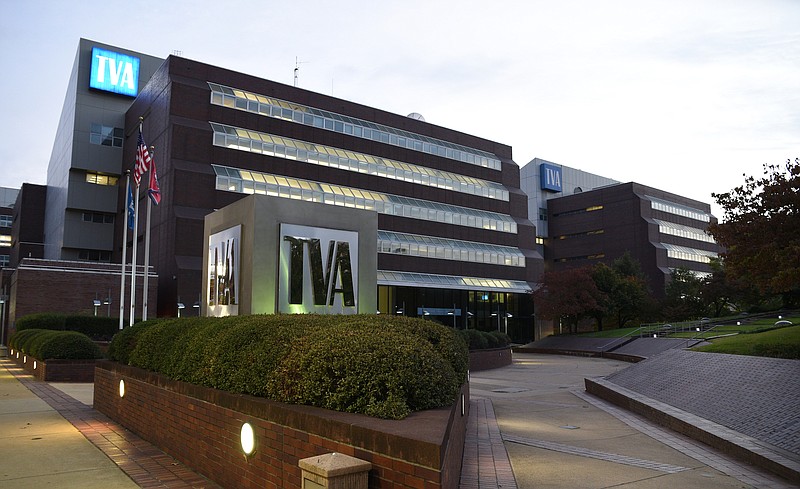America's biggest public utility would create more than 15,000 additional jobs while improving public health if it moved more quickly to carbon-free energy and phased out fossil fuels as an energy source by 2035, according to a new study.
The Tennessee Valley Authority doesn't expect to be carbon-neutral with its electricity generation until 2050, but a study commissioned by the Center for Biological Diversity suggests TVA could immediately begin retiring all of its coal plants to meet President Joe Biden's goal of a carbon-free electricity system within the next 12 years. The 45-page study on TVA's energy future by the Cambridge, Massachusetts, consulting firm of Synapse Energy Economics Inc. said switching away from fossil fuels for power generation and electrifying transportation and manufacturing would save the TVA seven-state region $255 billion by 2050.
Clean energy tax credits under the federal Inflation Reduction Act increase the opportunities and savings for TVA and its customers to shift from fossil fuels to renewable energy and electrify other economic sectors.
"TVA can launch an economywide clean energy revolution that directly benefits the people it was created a century ago to serve," Patrick Knight, a senior principal with Synapse and the study's lead author, said in a statement Wednesday. "Our data show the agency can reliably and affordably accelerate deployment of renewable energy resources to achieve 100% clean energy by 2035."
TVA has maintained a diverse portfolio of nuclear, natural gas, coal, hydroelectric, solar and wind generation to maintain what it says is both reliable and low-cost energy. To replace its aging coal plants, TVA is continuing to build new and more efficient combined cycle natural gas generators that limit carbon emissions by 60% compared with their coal-fired predecessors.
Natural gas as a 'bridge fuel'
But TVA President Jeff Lyash said natural gas will be needed for several more decades as a "bridge fuel" until advanced nuclear, hydrogen or carbon capture technologies are developed and effectively deployed. Gas-fired generators like what TVA is now building at its Paradise and Cumberland fossil plant sites can easily be turned on or off as demand warrants and generate power even when the sun doesn't shine or the wind doesn't blow.
"If we want to go further faster in our pursuit of a clean energy economy, we must work together across all sectors," Lyash said in a statement Wednesday. "We are committed to developing all pathways to a clean energy future, while maintaining reliability, affordability, resiliency and sustainability."
U.S. Rep. Steve Cohen, D-Memphis, said the study by Synapse Energy Economics demonstrates that with more investments in energy efficiency and renewable sources, TVA could save money and the environment.
"I have been urging TVA leadership to rethink its plan to build up natural gas as a 'bridge' to renewables, and this important study clearly endorses that approach," Cohen said in a statement Wednesday. "TVA could and can set a good example for the entire electric utility industry by making an uncompromising commitment to moving away from fossil fuel-based generation and embracing the future. I am hopeful this work will stimulate further efforts in that direction."
TVA has reduced its carbon emissions by more than 60% during the past two decades, primarily by boosting nuclear and hydroelectric generation and replacing older coal plants with more energy-efficient gas generation. TVA said it is moving toward a carbon-free portfolio as quickly and efficiently as it makes economic sense.
TVA is planning to add 10,000 megawatts of solar power and is now reviewing proposals for up to 5,000 megawatts of carbon-free generation to buy from other power producers. Lyash predicts demand for electricity could nearly double by 2050 as cars and trucks shift from gasoline to electricity and other sectors of the economy move away from fossil fuels and toward electric power.
"We have invested $18 billion in capacity expansion since 2014, and we are also investing another $2.8 billion in transmission infrastructure through 2027," TVA spokeswoman Ashton Davis said in a statement.
But the federal utility gets just 3% of its energy supply from solar and wind, and TVA has the second-largest planned gas buildout by 2030 among all major utilities.
Jobs from renewables
The Synapse study said TVA could generate another 15,600 jobs by constructing more solar and wind farms and adding more battery storage, as well as promoting more energy-efficient heat pumps in homes and businesses in the Tennessee Valley. A 100% carbon-free electric system would help save $27 billion in public health costs and avoided respiratory illnesses, the Synapse study estimates.
"The study shows that the country's largest public utility can help meet Biden's climate goals and put money in people's pockets, boost local economies and save lives," Gaby Sarri-Tobar, an energy justice campaigner at the Center, said in a statement. "There's no excuse for TVA to keep obstructing the clean energy transition and serving as a poster child for dangerous, fossil fuel-burning utilities. Instead of being a mega-polluter, TVA needs to tap back into its pioneering roots and show the whole country what a just transition to a clean, resilient, affordable energy future looks like."
TVA recently announced the Baker Center at the University of Tennessee in Knoxville will conduct an 18-month study on ways to reduce carbon pollution in the Tennessee Valley. But the utility has yet to release plans on the role of renewable energy and distributed resources or how its study will be integrated into upcoming long-term energy planning, however.
Contact Dave Flessner at dflessner@timesfreepress.com or 423-757-6340.
